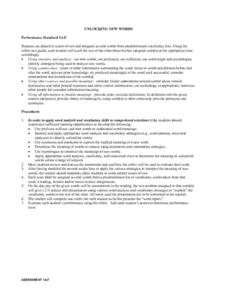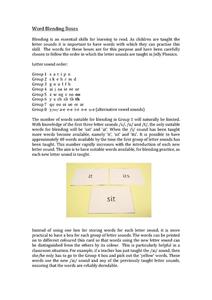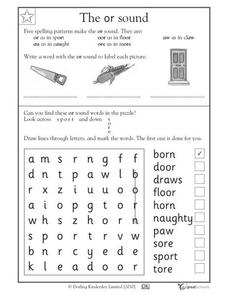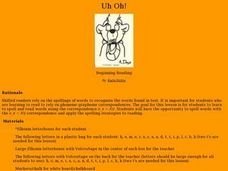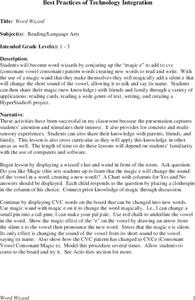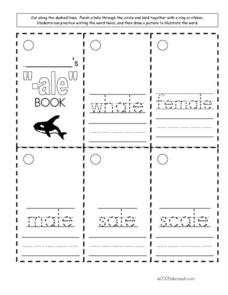Florida Center for Reading Research
Phonics: Varient Correspondances, Silent "e" Changes
Engage early readers in a silent e activity to help them understand the changes the letter can make to a simple word. With the provided cards, learners read and write each word as it appears without the silent e. Then they read and write...
Curated OER
Write Your Own i-e Poem
In this recognizing words spelled with the i-e pattern worksheet, students list words that rhyme, use word banks to fill in the blanks and use one or more to complete lines of a poem. Students write fourteen answers.
Curated OER
Unlocking New Words: Partner Presentations
Following extensive modeling about how to apply word analysis and vocabulary skills to learn new words, partner teams create brief word presentations to teach new vocabulary to the class. Preselect words from upcoming social studies,...
Jolly Learning Ltd
Word Blending Boxes
Get all your blends organized into neat little boxes! This resource provides pages and pages of words that you can print out and place into labeled boxes so that you can find the exact words you want to work on with your class...
Curated OER
Long Vowel Sounds "i-e"
In this long vowel sounds "i-e" worksheet, 2nd graders look at four pictures, read the clues and guess what the word is that fits the "i-e" pattern.
Curated OER
Phonics: Decode and Write Words with the “Silent e”
What happens when I add an 'e' to the word mad? It becomes made! Decoding and writing words with the silent e is the lesson for today. The class discusses what the e can do to a cvc word, then they practice adding e's to various words in...
Curated OER
More Spelling Patterns
Pass the time...creating rhymes! Writers connect rhyming words with -ough in them, writing them as rhyming pairs. Next, they put their poetic skills to the test by applying the words in rhyming couplets. There is an example...
Curated OER
Word Center
Construct spelling words through a Making Words activity. Learners create words at various levels using onsets, rimes, suffixes, long and short vowels, and word families. They write words as they create them and compare the words with...
Curated OER
The or Sound
Before using this vowel sounds crossword activity, be forewarned that the pronunciation here is based on British English, and will be confusing for American English speakers. Learners focus on the /or/ sound, examining five spelling...
Curated OER
Practicing Sight words
Review sight words with readers. They will look over their sight words and come up with sentences for each of them. They also review the alphabet and identify unfamiliar words.
Curated OER
Word Game!
Early finishers beware! Here is a fun word game creative thinkers will really enjoy. They attempt to make as many words as they can using the word transport. Strict rules make this task a real challenge. Tip: Also great to use in a fun...
Curated OER
Uh Oh!
Help your elementary learners distinguish between short and long vowel /o/ sounds. They are introduced to the vowel-consonant-e pattern that changes short vowel sounds into long vowel sounds. Then they practice reading and spelling words...
Starfall
The Amazing Silent E—Changing Short /a/ Words
In this language arts activity, students learn the amazing power of the silent E to change short vowel /a/ words to long sounds. Students change two words and then write sentences for each.
Curated OER
Word Wizard
Young scholars make magic wands to become word wizards who add the magic "e" to word with cvc patterns. They make reading cards, and a multimedia presentation show the use of the word patterns.
Curated OER
VCe Rule Accuracy
Explore word structure by participating in a vowels and consonants activity with young readers. They will read words their teacher points out in class and pronounce them correctly. Then they identify the words they say which have a...
K12 Reader
Long Vowels
Keep things short and sweet for your young learners with a simple long vowel instructional activity. Presented with four long vowel words with the vowels missing, children must correctly identify and write in the letters...
Curated OER
Trees-- Rhyming Words
For this reading and writing worksheet, students read a poem about different kinds of trees. Students practice writing the rhyming words on primary lines, color the pictures and staple these pages into a book.
Curated OER
R-e-l-a-t-i-o-n-s-h-i-p-s
Second graders combine letters to make several short words. They create word families and discuss letter patterns and make one word from all the letters at the end of the lesson.
Curated OER
I Ate Grape Cake
Students distinguish between the sounds for short vowel a and long vowel a. They are introduced to the vowel patterns that comprise long vowel sounds, with a particular emphasis on vowel-consonant-e pattern. They practice reading and...
Curated OER
Spanish-English Cognates in the ELL Classroom: Friends or Foes?
Define the meaning of a cognate and use the concept to help Spanish-speaking ELLs connect their first language to English. Middle schoolers explore Latin roots to find cognates in both languages. They relate the Spanish and English word...
Curated OER
ank Word Search
In this vocabulary worksheet, students study the "-ank" rhyming pattern by finding 12 words in a word search puzzle. There is a word bank provided.
Curated OER
Tiles, Blocks, Sapphires & Gold: Designing a Treasure Map
Young cartographers in groups hide treasure at school and then create a map to find it using pattern blocks and tiles. They make paintings with clues to create a visual representation of the location of their treasure. Groups present...
Curated OER
The -ale Ending
This is a very useful resource to use with younger or special needs learners. It includes five printable worksheets which all reinforce the -ale ending and spelling pattern. Printing practice, fill in the blank, complete the pattern, and...
Florida Center for Reading Research
Advanced Phonics: Syllable Patterns, Syllable Game
A game designed to support advanced phonics instruction challenges scholars to read and break a word into syllables. If the player is correct, they move their game piece forward on the board. Whoever gets to the end first wins!


